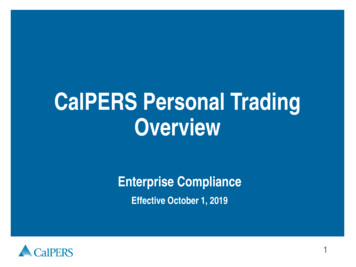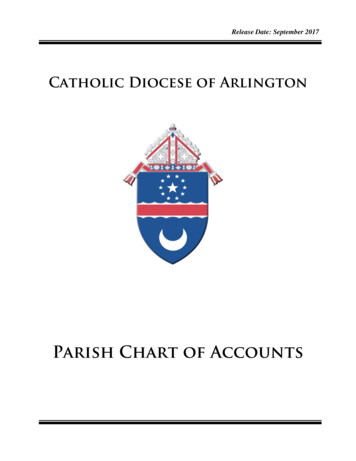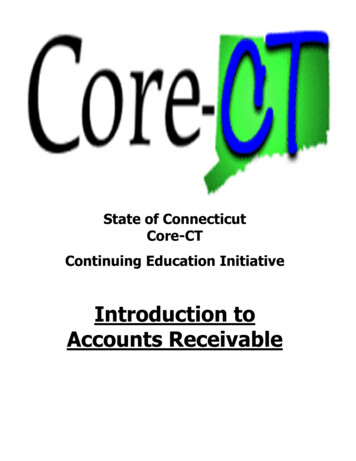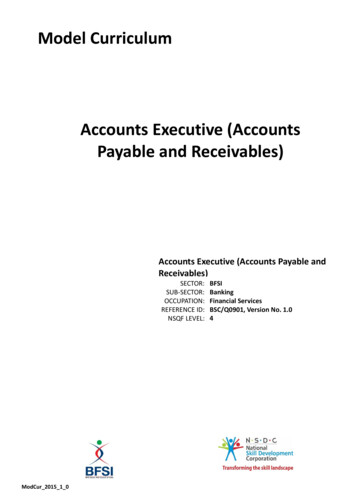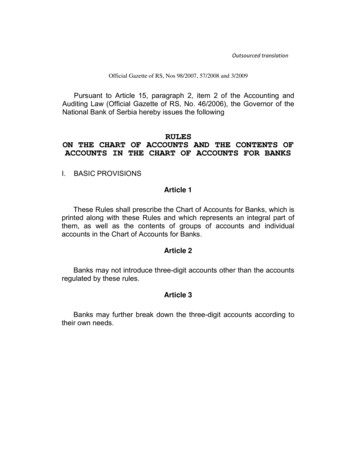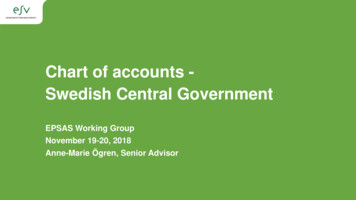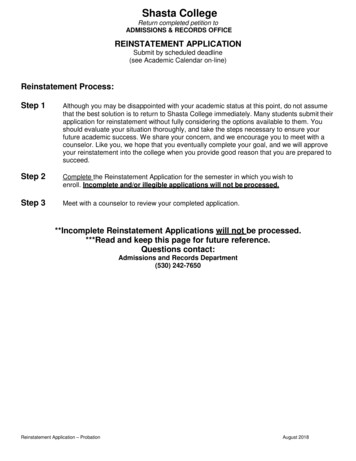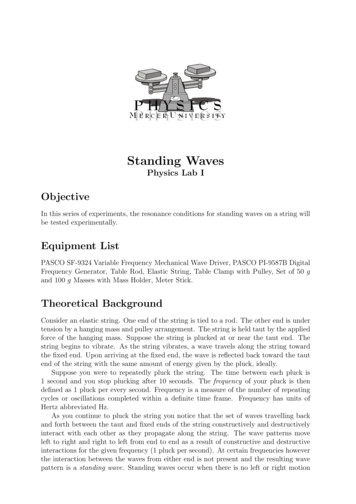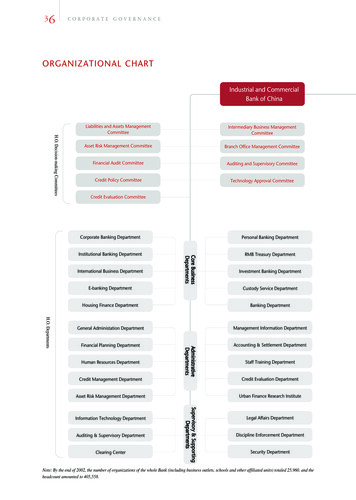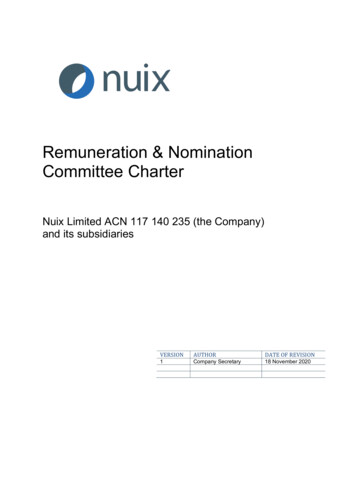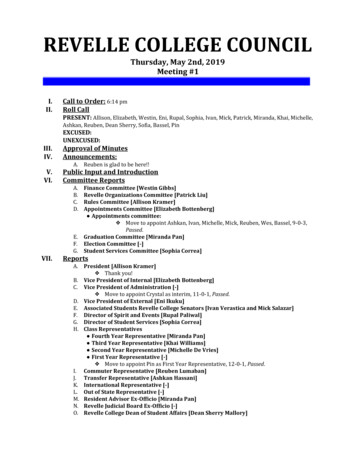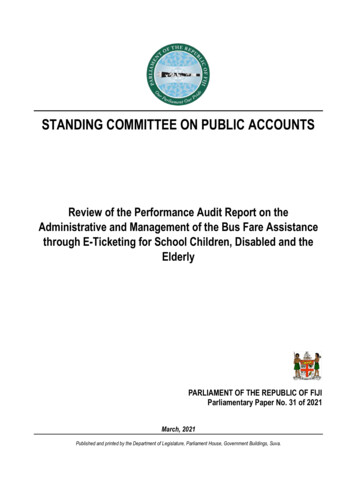
Transcription
STANDING COMMITTEE ON PUBLIC ACCOUNTSReview of the Performance Audit Report on theAdministrative and Management of the Bus Fare Assistancethrough E-Ticketing for School Children, Disabled and theElderlyPARLIAMENT OF THE REPUBLIC OF FIJIParliamentary Paper No. 31 of 2021March, 2021Published and printed by the Department of Legislature, Parliament House, Government Buildings, Suva.
TABLE OF CONTENTCHAIRPERSON‘S FOREWORD . 1LIST OF ACRONYMS . 2COMMITTEE MEMBERS . 3INTRODUCTION . 4COMMITTEE PROCEDURE . 4COMMITTEE MEMBERS . 4BACKGROUND . 5SUMMARY OF THE FINDINGS . 71.Administration of the Program . 72.Management of the Performance Bus Fare Assistance Program through e-Ticketing for school children, disabled and the elderly . 73.Data Analytics. 8KEY FINDINGS. 91.0 Administration of the Program . 9Theme 1: Legal and Policy Framework. 9Theme 2: Standard Operating Procedure . 15Theme 3: Service Agreement between Ministry of Education Heritage and Arts and E-Ticketing Service Provider for Students Fare . 17Theme 4: E-ticketing Agreement for the Department of Social Welfare . 18Theme 5: Management of Feedback and Complaints . 20Theme 6: Conflict of Interests . 222.0 Management of the Perfrmance Bus Fare Assistance Program through E-Ticketing for school, Disabled and the Elderly .26Theme 1: Reports from the E-Ticketing Service Provider . 23Theme 2: Regular Monthly Reconciliation . 25Theme 3: Initial Listing of Eligible Students . 27Theme 4: Exit by Elderly from the Bus Fare Concession Card . 28Theme 5: Review of Transport Assistance Implementation for Senior Citizens and People with Disability . 29Theme 6: Review of the Students Bus Fare Assistance . 31Theme 7: School Zoning . 32Theme 8: Student Bus Fare Assistance Application Process. 353.0 Data Analytics . 43Theme 1: Data on Elderly and Fijians with Disability . 40Theme 2: Data on Students . 45RECOMMENDATIONS . 48SUSTAINABLE DEVELOPMENT GOALS (SDGs) . 49GENDER ANALYSIS . 49CONCLUSION . 50APPENDICES . 52i
CHAIRPERSON’S FOREWORDI am pleased to present this review report on the performance audit on the Administrativeand Management of the Bus Fare Assistance through E-Ticketing for the SchoolChildren, Disabled and the Elderly.The Office of the Auditor General had conducted a performance audit to ascertain theefficiency and effectiveness of government‘s Bus Fare Assistance program through ETicketing for the school children, disabled and the elderly. Given the sustainabledevelopment objectives of the Fiji Government as prioritized in the National DevelopmentPlan, the provision of bus-fare assistance through e-ticketing is a government initiativetargeted at providing and promoting ‗quality education for all‘, ‗ social inclusion and empowerment‘, ‗youth development‘and ‗women and gender equality‘.The Bus-fare assistance through e-ticketing to school children from low income families attempted to ensure that allschool children have access to quality education. However, the scope of the audit did not cover the acquisition of theservices of the e-ticketing provider.The audit examined the various functional roles of the Ministry of Education and the Department of Social Welfare andhow they managed the e-ticketing program. The audit also looked at the monitoring and reporting aspects of theprogram and how the information maintained by the e-ticketing service provider were scrutinized, analyzed and reportedto the respective Ministries/Departments.The Committee noted that a total of 88,579 students received transport assistance vouchers in 2009 when it startedwhile 80,879 elderly and disabled persons received 50% concession voucher in 2011. In 2017, the e-ticketingprocesses for bus fare was implemented and by Term 3 of 2019, a total of 66,674 students and about 51,444 seniorcitizens and persons with disability received e-transport cards to utilize e-ticketing. The elderly and disabledpersons received full 100% assistance for their fare at the maximum value of 40 per month in 2018.The two Ministries that were scrutinized by the Committee were requested to forward their responses to the Committeedue to COVID 19 restrictions that were in place at that time. The Committee deliberated using the Parliament virtualplatform (Microsoft Teams), the written responses and formulated recommendations to address audit issues that wereidentified.I wish to extend my appreciation to all the Honourable Members of the Committee who were part of the successfulcompilation of the bipartisan report namely Hon. Joseph Nand, Hon. Virendra Lal, Hon. Aseri Radrodro, and Hon. RoTeimumu Kepa. Further, pursuant to Standing Order 115 (5), Hon. Adi Litia Qionibaravi stood in as an alternate memberto Hon. Ratu Naiqama Lalabalavu and Hon. Mikaele Leawere who stood in as an alternate member to Hon. AseriRadrodro.On behalf of the Committee I also extend my appreciation to the Secretariat Staff for their timely support on research,liaisons with the two (2) Ministries and the compilation of this Report.Hon. Alvick Avhikrit MaharajChairperson1
LIST OF ACRONYMSABBREVIATIONMEANINGACPAnnual Corporate PlanDSWDepartment of Social WelfareFRCSFiji Revenue and Customs ServicesMEHAMinistry of Education Heritage and ArtsMoEMinistry of EconomyMOUMemorandum of UnderstandingMWCPAMinistry of Women Children and Poverty AlleviationM PaisaE-ticketing service provider‘s Money Transfer ServiceNDPNational Development PlanPSEHAPermanent Secretary For Education, Heritage and ArtsSDGSustainable Development GoalsSOPStandard Operating ProceduresTAUTransport Assistance UnitVKBVola-Ni-Kawa Bula2
COMMITTEE MEMBERSHon. Alvick Avhikrit Maharaj(Chairperson)Hon. Joseph Nitya Nand(Deputy Chairperson)Hon. Aseri Masivou Radrodro(Opposition Member)Hon. Ro Teimumu Kepa(Opposition Member)Hon. Virendra Lal(Government Member)3
INTRODUCTIONThe Audit report on the performance audit on the Administrative and Management of the Bus Fare Assistancethrough E-Ticketing for the School Children, Disabled and the Elderly (PP. No. 71 of 2020) was tabled inParliament on 31 July, 2020 sitting and referred to the Standing Committee on Public Accounts to scrutinize.Standing Orders 109(2) (d) allows Standing Committee on Public Accounts to examine the accounts of theGovernment of the Republic of Fiji in respect of each financial year and reports of the Auditor-General, and forany other matter relating to the expenditures of the Government of the Republic of Fiji or any related body oractivity (whether directly or indirectly) that the committee sees fit to review.COMMITTEE PROCEDUREThe Committee conducted its meeting on virtual platform to review the Audit Report. The Committee soughtformal clarifications from the Office of the Auditor General regarding updates on audit issues and the auditrecommendations. The Ministry of Education, Heritage and Arts and the Ministry of Social Welfare were alsorequested to provide their responses on issues that were raised in the audit report.Due to the COVID 19 restrictions, it is important to note that the usual face to face Committee proceedingswith Ministries and Departments were not followed according to the Standing Orders 112 (1) (e). TheseMinistries and Departments were requested instead to provide written responses on audit issues that wereidentified.COMMITTEE MEMBERSThe substantive members of the Standing Committee on Public Accounts are:1.2.3.4.5.Hon. Alvick Avhikrit Maharaj, MP (Chairperson)Hon. Joseph Nitya Nand, MP (Deputy Chairperson)Hon. Virendra Lal, MP (Member)Hon. Ro Teimumu Kepa, MP (Member)Hon. Aseri Masivou Radrodro, MP (Member)During a Committee meeting, the following membership arose pursuant to Standing Order 115 (5):1.Hon. Mikaele Leawere (Alternate Member for Hon. Aseri Masivou Radrodro)4
BACKGROUNDThe Bus Fare Assistance program through electronic ticketing was implemented in 2017 to assist schoolstudents from low income earning families to attend school, the elderly and the disabled to be able to travelwhen required.The program was aligned to the 5 Year and 20 Year National Development Plan and the E-transportassistance was implemented to reduce the financial burden on parents who are unable to afford transportationcosts while at the same time enable students to gain access to quality education and promoting equality andsecondly to recognize the contribution of senior citizens and disable persons in the country and allow them tocommute at an affordable rate and ensuring transport accessibility.The current stakeholders directly involved in the Bus Fare assistance program are the Ministry of EducationHeritage and Arts (MEHA), who administer and manage student‘s bus fare assistance and the Department ofSocial Welfare (DSW) of the Ministry of Women Children and Poverty Alleviation which administers andmanages the elderly and disabled‘s bus fare assistance program. The external stakeholder is the sole serviceprovider of e-ticketing service machines and top-up platforms. The relationship between the Department ofSocial Welfare and the e-ticketing service provider is founded in an undated agreement which stipulates theduties and responsibilities of each party. The Ministry of Education is yet to formulate a similar agreement withthe e-ticketing service provider.A total of 88,579 students received transport assistance vouchers in 2009 when it started while 80,879 elderlyand disabled persons received 50% concession voucher in 2011. In 2017, the e-ticketing process for bus farewas implemented and by Term 3 of 2019, a total of 66,674 students and about 51,444 senior citizens andpersons with disability received e-transport cards to utilise e-ticketing.The elderly and disabled persons received full 100% assistance for their fare at the maximum value of 40 permonth in 2018.Students living in rural areas that have no bus services still use vouchers to travel on carrier, minibuses andpunts. Public funds amounting to 100m have been spent over 3 years since the assistance was deliveredthrough the e-ticketing platform in 2017.The Bus Fare Assistance program through e-ticketing has sufficient mandate under the constitution to enableit to be functional and effective in providing the required assistance to deserving school children, elderly andpersons with disabilities. However, we determined that policies and procedures implemented to support theCabinet decisions are outdated and need to be reviewed as they were prepared for the voucher system beforethe e-ticketing system was introduced. Similarly, the absence of an agreement between the external eticketing service provider with the Ministry of Education and undated agreement between the external eticketing service provider and Department of Social Welfare needs to be rectified to ensure that the interests ofgovernment are adequately protected.Anomalies were found given the poor internal controls including lack of monthly reconciliations of recordsbetween the two government agencies and the e-ticketing service provider. There is also a need to worktowards mitigating risks identified which can cause overpayment. These include the risk of over-payment ofassistance through excessive top-ups, school fares paid beyond the school zones, payment of assistance to5
ineligible recipients, lack of declaration of interest by processing officers, and continued top-up of cards fordeceased senior citizens. The risk of fraud for unused balances in cards also exists.Generally, the system has been effective in providing bus fare assistance through the e-ticketing platform.However, utilisation of resources could be improved with an effective and accountable internal control system.6
SUMMARY OF THE FINDINGSOutlined below are the summary of the audit findings that were reviewed by the Committee on three (3) keyaudit focused areas:1. Administration of the Program The Ministry of Education was yet to review its policy which was due for review in 2016 whilst theDepartment of Social Welfare was yet to develop a policy framework for e-transport services.mm The Ministry of Education were yet to review its Policy on Transport Assistance and Standard OperatingProcedures (SOPs) to include the responsibility of the e-ticketing service provider to outline the reportingresponsibility as required under the Electronic Fare Ticketing Act 2014. The SOPs that was prepared bythe Department of Social Welfare were yet to be endorsed by the Permanent Secretary. There was no formal agreement (Service Level Agreement) between the Ministry of Education and the eticketing service provider. Review of the agreement between the Department of Social Welfare and the service provider highlightedgaps in the agreement that needs to be improved. Although complaints were recorded by the Units within the respective Ministry and Department, there wasno clear process on the manner in which feedback was to be provided to the complainant. Policies and processes for declaration of conflict of interest for officers involved in the program had notbeen developed by the Ministry and Department to manage any conflicts.2. Management of the Performance Bus Fare Assistance Program through e-Ticketing for schoolchildren, disabled and the elderly There had been an absence of acceptable data governance process where agreements are made toensure that relevant information such as exception reports on the actual use of cards, travel patterns andbehavior of eligible students were captured and monitored Regular reconciliation had not been carried out between the records kept by the Ministry and Departmentagainst the records kept by the e-ticketing service provider. The Department of Social Welfare did not have had any mechanism within its processes which related toexit of recipients from the bus fare assistance programs for senior citizens and persons living withdisability. On the review of the Transport Assistance implemented for Senior Citizens and People with Disability, theMonitoring and Evaluation Team of the Department of Social Welfare made eight (8) recommendations aspart of its evaluation of the program. As at May 2020, the Department had only addressed onerecommendation. The OAG reviewed the MEHA internal audit report in May 2020 revealed six (6) findings that were relatedto the Bus Fare Assistance program. For example, inconsistencies were noted in the approval andrejection of applications on bus fare assistance provided on the zoning of students based on theirresidential address even though the head of school considerably monitored this limit. The TAU hadworked towards implementing the recommendations made in respect of these issues.7
A significant number of anomalies were noted in the student bus fare assistance application processwhich needs to be addressed by the Policy on Transport Assistance.3. Data Analytics Other forms of ID were also accepted by the e-ticketing service provider apart from the ID that was issuedby the Department of Social Welfare. In some cases, there was more than one user for one active ID. Monthly loading on Exempt and Concession cards, in some cases, were more than the approved monthlyamount of 40. There were also issues of funds being incorrectly transferred from one recipient ID to another. There were inconsistencies between the records maintained by the ticketing service provider and theMinistry of Education8
KEY FINDINGSThe Committee reviewed the three (3) audit focused areas, namely the Administration of the Program,Management of the Performance Bus Fare Assistance Program through e-Ticketing for schoolchildren, disabled and the elderly, and the Data Analytics.1.0Administration of the ProgramTheme 1: Legal and Policy FrameworkAudit ObservationThe constitution emphasizes the importance of education, equality and inclusiveness of people living withdisability as a priority for social and economic development. The National Development Plan has beendeveloped in alignment to the Sustainable Development Goals (SDG). Government initiative to assist the poorand those receiving social benefits has been further enhanced with the provision of transport assistance.The processing of the transport assistance had been greatly improved with the introduction of e- ticketing in2017 whereby recipients were issued electronic bus cards to access the assistance as compared to the use ofvouchers between 2010 and early 2017.The Policy on Transport Assistance for the MEHA which was approved in 2015 has not been reviewed. It wasdeveloped before the introduction of the e-ticketing system and still refers to processes dealing with the issueof vouchers to students.In addition, the audit found that the DSW did not have any policy on the provision of transport assistance tothe elderly and people with disabilities.Neither MEHA nor DSW conducted any risk assessment when the bus fare assistance through externallyprovided e-ticketing system was implemented.CriteriaA person with any disability has the right to reasonable adaptation of buildings, infrastructure, vehicles,working arrangements, rules, practices or procedures, to enable their full participation in society. Everyonehas the right to education; including (a) early childhood education; (b) primary and secondary education; and(c) further education. The state must take reasonable measures within its available resources to achieve theprogressive realisation of the right—(a) to free early childhood, primary, secondary and further education; and(b) to education for persons who were unable to complete their primary and secondary education.A person with any disability has the right— (a) to reasonable access to all places, public transport andinformation; (b) to use sign language, braille or other appropriate means of communication; and (c) toreasonable access to necessary materials, substances and devices relating to the person‘s disability. (2) Aperson with any disability has the right to reasonable adaptation of buildings, infrastructure, vehicle, workingarrangements, rules, practices or procedures, to enable their full participation in society and the effectiverealisation of their rights. (3) To the extent that it is necessary, a law or an administrative action taken under alaw may limit, or may authorize the limitation of, the rights set out in this section.9
A policy is a formal statement of a principle that should be followed in an organization. It is a writtendeclaration of policy decisions which sets the direction or strategy for how the organization should approachand address something.Risk Management is the systematic application of management policies, procedures and practices to the taskof identifying, analyzing, assessing, treating and monitoring risk. It is not just about identifying risks, it is aboutlearning to understand and weighing the level of risk or the criticality of the risk. Criticality is obtained bycombining the likelihood of being exposed to a risk and the consequences of the risk. All section/unit headsshall be responsible for incorporating risk management into their standard management practices byidentifying and determining appropriate actions to address operational and business continuity risks withintheir jurisdictions in accordance with MEHA policies and procedures. The MEHA shall recognise that riskmanagement is an integral function of an effective service delivery and is not an isolated activity. Allsection/unit heads shall demonstrate a high level of awareness, acceptance and support risk management.Evidence and its AnalysisThe Cabinet in its special meeting held on 13th December 2009, approved the Ministry of Education‘ssubmission on the proposed Implementation Strategy of the Transport Assistance to Students. Cabinet agreedon the following: the criteria for eligibility to the transport assistance for students in 2010 as proposed under section 4.0(A,B and C) of the memorandum; and the implementation strategy as proposed in section 5.0 and 6.0 of the memorandum.Since the implementation of the Transport Assistance program in 2009, vouchers and coupons were themedium used to disburse the assistance when students board school buses, RSL carriers as well as the useof punts for school trips.In 2017, government initiated and implemented a more robust and innovative means of disbursing the bus fareassistance through the electronic bus fare ticketing system. This was enabled though the Electronic FareTicketing Act 2014.The Act requires the use of e-ticketing cards by all commuters which is to be swiped in all buses through eticketing machines. Electronic ticketing is limited to bus services only within areas that catch the telephonenetworks, students using RSL carriers and punt are still using vouchers and coupons till to date. Refer to thegraph below for the chronological order of the bus fare assistance program.10
Figure 3.1: Chronological order of Bus Fare Assistance programs2009 Start of Bus fare subsidy program for school student using coupons and voucher Starting of 50% bus fare concession for elderly and free travel for people living with 7th April20192019 Initial launching of e-ticketing system Mandatory/ compulsory ticketing system for all passengers Full concession on monthly allowance for elderly and people living with disability Launch of e-ticketing kiosk for self top-ups at various bus stands and vodafone outlets Continuation of the free e-ticketing services for school students, elderly and disableIn 2017, government enacted the Omnibus Electronic Fare Ticketing (Budget Amendment) Act 2017 whichmakes reference to the Electronic Fare Ticketing Act 2014 as the principal Act. The principal Act regulates theuse of electronic cards by all citizens including subsidized students, nonsubsidized students, senior citizensand people living with disability.The government‘s plan and actions are aligned and implemented in accordance to the SustainableDevelopment Goals; Goal 1 to reduce poverty, Goal 4 to provide quality education for all and Goal 10 toeliminate inequality.Part 3.1.5 of the NDP emphasizes on the theme Quality Education for all. Quality education for all is essentialto create a more skilled and adaptable workforce and create a knowledge based society. Further discussionsstate that with the free-education initiative, free bus fares and free textbooks, enrolment numbers haveincreased significantly. More teachers have been recruited, and continuous hiring of quality teachers willcontinue to improve the teacher to- student ratio for rural and urban areas.Under the NDP Goals and Policies, Goal Number 2 emphasizes on ensuring every Fijian student has equalaccess to education at all levels including the provision of assistance towards students bus fare. The extractbelow from the NDP includes strategies such as continuation of free education initiatives and bus fare subsidy.11
Table 3.1: National Development Plan Policy and Strategies on Equal access to EducationPoliciesEnsure every Fijian Student has equal access to educationat all levels.StrategiesContinuation of free education initiative, bus fare subsidy,free textbooks, toppers scholarships and tertiary loanscheme. Improve infrastructure, facilities and learning materialsfor all schools. Timely provision of textbooks and building grants toschools. Provision of access for the physically challengedstudents. Updating of the Fiji Education Management InformationSystem (FEMIS) to cover all aspects of schoolinformation. Development of an e-library or virtual library for allcitizens.Source: Fiji NDP12The NDP has annual targets and total expected output projected to be achieved und
the e-ticketing system was introduced. Similarly, the absence of an agreement between the external e-ticketing service provider with the Ministry of Education and undated agreement between the external e- ticketing service provider and Department of Social Welfare needs to be rectified to ensure that the interests of .
